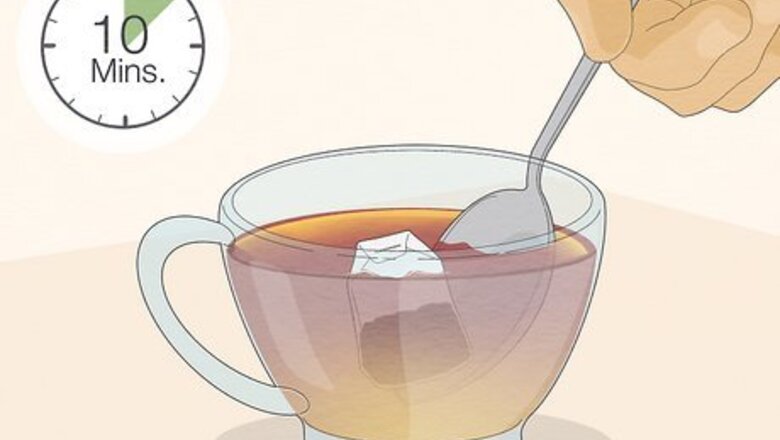
views
Using Teabags
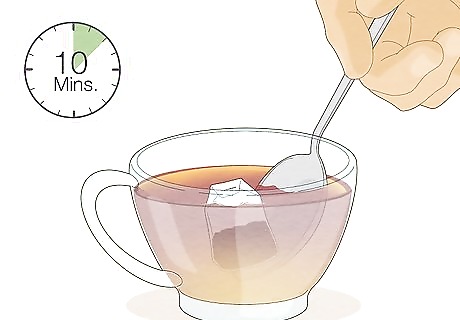
Steep black teabags in hot water. Black tea has a high concentration of tannins, a substance that works well for killing odor-producing bacteria in your shoes. Steep two teabags, one for each shoe, in boiling water for two to three minutes. To prevent yourself from getting burned by a hot teabag, you may want to use a utensil for removal. A spoon, fork, or tongs can help you safely remove your teabags. Allow your teabags to cool for a few minutes after removing it from the boiling water. This will make it easier to handle with your fingers. For light odors, a single teabag per shoe may be enough to rid it of its bad smell. Odors that are especially strong may require several teabags.
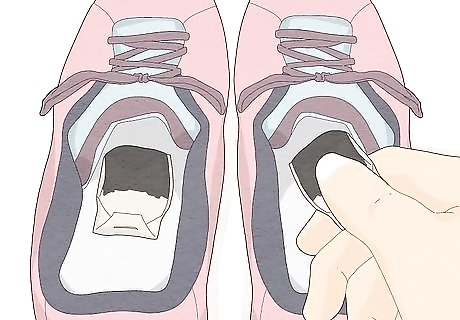
Insert one teabag into each shoe. The teabags should still be moist from being steeped. The moisture will allow the tannins to seep into the insole of your shoe to more effectively fight the odor-causing bacteria. For very strong odors, you may want to layer extra teabags along the entire length of each insole from the toe of the shoe to its heel.
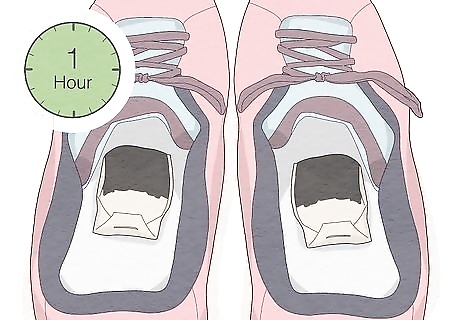
Leave the teabags in your shoes for about an hour. An hour should be enough for the treatment to lessen or eliminate the odor in your shoes. Then, remove your teabags, wipe up any remaining moisture, and allow your shoes to air dry. In bad odor cases, you may want to let your teabags sit in your shoes for up to two hours. You can speed the drying process along with a blow drier. Simple point the blow drier so the hot air blows into the shoe until the shoe is completely dry.
Using Essential Oils
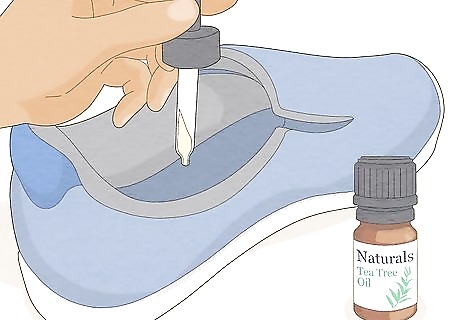
Drip essential oils on the insoles of your shoes. Choose an essential oil that both fights bad smells and suits your preferences. Some popular oils for you to consider include tea tree, clove, and peppermint oil. A few drops on each insole should be sufficient to mask the smell. If you have difficulty dripping the oil on the insole of your shoe or getting the oil into the toe of a shoe, you could soak a cotton ball or two in the oil. Then, push the cotton ball into the toe of the shoe.
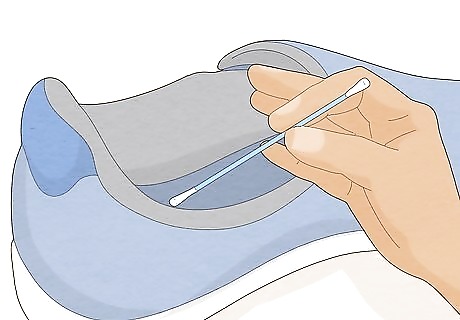
Distribute the oil across the insole. To spread the odor fighting properties of the oil throughout your shoe, you'll need to spread it around the entire insole. To do this, you can use your fingers or an applicator, like a cotton swab. Keep in mind that essential oils have a potent scent. Using your fingers could leave your hands smelling like the oil for a while. Be careful to keep the oil from coming in contact with the outside of the shoe, or any visible part of it. Some materials can be stained by essential oils, especially oils that are dark in color. For extra odor fighting potential, you can mix a few drops of essential oil in with a heaping spoonful of baking soda, which absorbs bad smells. Stir these ingredients together in a small bowl, then spread it liberally over the insole.
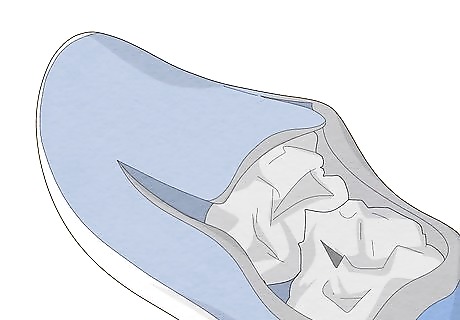
Stuff your shoes with oil-scented paper. Newspaper works well for this purpose. Crumple the paper into balls, add a few drops of essential oil, and stuff your shoes with the paper. The paper will absorb moisture from your shoe and create a less hospitable environment for odor causing bacteria. You can remove and throw away the paper when the odor vanishes. A few hours might be enough to free your shoes from the unpleasant smell, but bad cases can best be treated by leaving the paper in overnight. You may want to check your shoes after a few hours have passed. Remove the paper and give your shoes a sniff to see if the odor has dissipated. If it has not, replace the paper and allow more time to pass before removing the paper for good.
Using Cat Litter
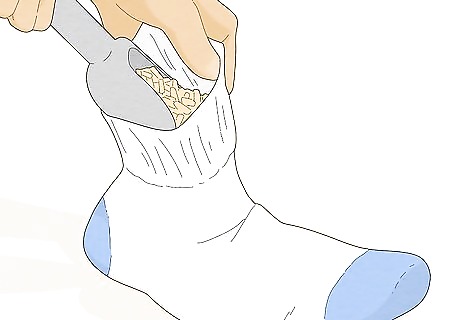
Fill two clean socks with clean cat litter. To prevent the cat litter from spilling inside or around your shoes, you should tie off the top of each litter filled sock with a simple knot. You can also put cat litter directly into your shoes, though litter can sometimes get caught in the crevices of your shoe and cause you discomfort later on. In place of socks, you could also use pantyhose. The thin material of these will form less of a barrier between the odor fighting elements of the litter and the bad smelling parts of your shoe. To give your cat litter a little more punch, you might consider adding some baking soda to it. Simply add a heaping spoonful to each sock, tie each off at the top, and shake or massage the socks to distribute the baking soda.
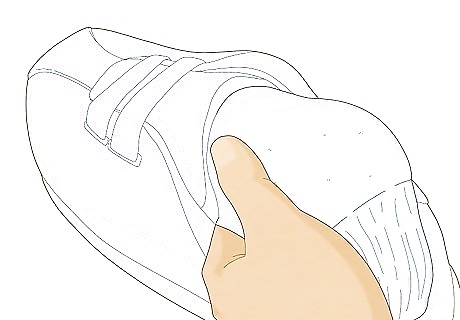
Place the cat litter filled socks into your shoes. If you notice that your socks cause your shoes to deform or otherwise change shape, you may want to remove some litter from the socks. You'll be leaving the litter filled sock in your shoes for a long period of time, and a sock that is too full might alter the shape of your shoe. If you find that your socks are too full, hold your socks over a garbage can while unknotting the tops. This way, stray litter will be contained in the garbage, preventing a mess.
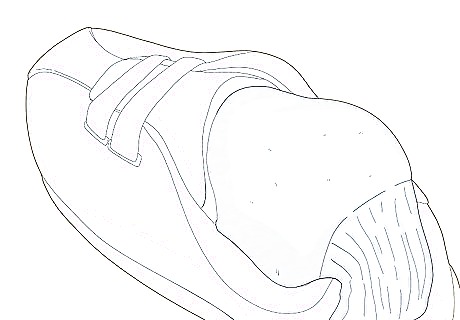
Leave the socks in your shoes overnight. In most cases, it should only take a night for the odor fighting properties of the cat litter to eliminate the smell. Especially bad cases, however, might take more time. You can check the odor of your shoes by removing the sock briefly and smelling the shoe. If you notice a lingering odor, you should leave the litter filled socks in the shoe for longer. Once the odor is removed from your shoes, you can throw away the cat litter and wash the socks as you would normally. If the cat litter is still good enough to use in a litter box, you may want to reuse the litter there. Give your shoes a thorough inspection after you've removed the litter filled socks. Small pieces of litter can sometimes push through the fabric of the sock and become an irritant later when you wear the shoes.
Using Fabric Softener Sheets
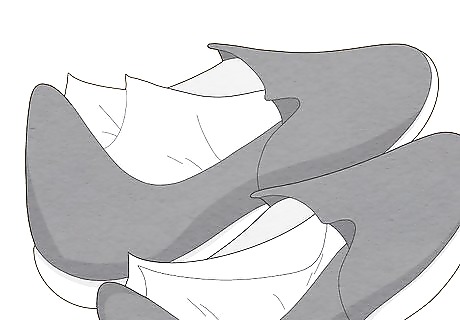
Tuck fabric softener sheets into your shoes. You may be more familiar with softener sheets by the name of dryer sheets, but in either case, the odor fighting properties of this product are perfect for de-stinking shoes. You can simply push a sheet into each shoe, or you can slip one underneath each insole. Used dryer sheets can also be used to combat shoe odor. This is a great way to recycle, and will leave your shoes smelling laundry-fresh.
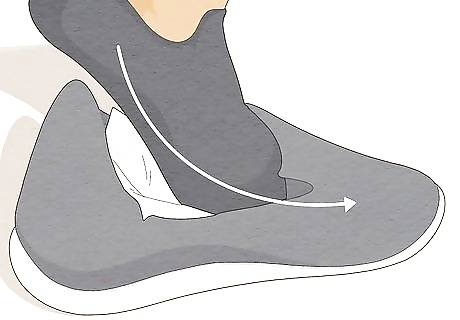
Wear your shoes with dryer sheets. Dryer sheets are relatively thin and light, and the heat of your foot will help release its odor fighting ingredients. However, sometimes dryer sheets can bunch up in the toes of your shoe and become uncomfortable. If you find this happens to you, leaving dryer sheets in your shoes while you're out and about might not be the best option. Most sheets will last about a week before the odor fighting potential is lost. Once your dryer sheets stop smelling fresh, you can throw it out and replace it with a fresh one.
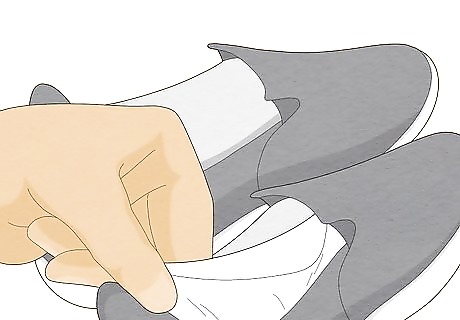
Remove the dryer sheets when the odor is gone. If your shoes have thin insoles or you have sensitive feet, or if you find that dryer sheets uncomfortably wad up in your shoes, you may only want to use dryer sheets when your shoes are off. A few hours with dryer sheets inserted will usually be enough to chase away the stink. Severe cases might benefit from a night spent with dryer sheets inserted in each shoe.
Using Disinfectant Sprays
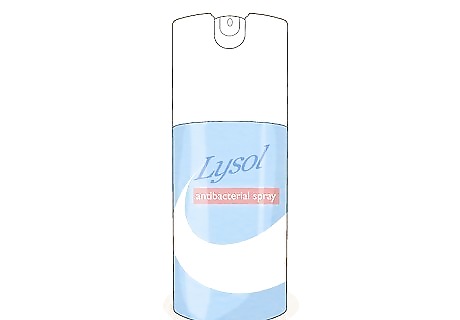
Choose a suitable spray. The odor coming from your shoes is often the product of bacteria and sweat. You should choose a spray that is anti-bacterial to kill the odor creating germs, but you might also want to use an anti-fungal foot powder. Molds and other kinds of fungi thrive in dark, moist environments, and an anti-fungal could help your foot odor problem. Some common disinfecting sprays include Lysol, Smelleze, and Dr. Scholl's foot spray. Most of these products can be found at your local drug store or pharmacy.
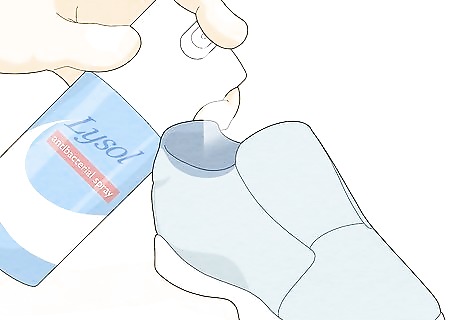
Spray the inside of your shoe. Pick your shoes up one at a time and spray a liberal amount of your disinfectant/deodorizing spray inside. It may be easiest for you to hold your shoe upside down and point the sprayer toward the toes of your shoes. This way, the spray spreads throughout the entire length of your shoe.
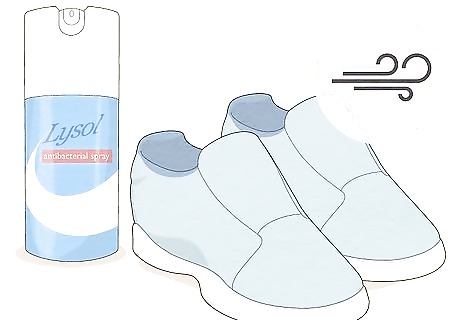
Allow the shoes to dry and respray as needed. Your shoes should air dry quickly after being sprayed with disinfectant/deodorizer. If you applied your disinfectant/deodorizer in the evening or before going to bed, in the morning it should be dry. For daytime deodorizing, you can speed the drying process by leaving your shoes in the sun. If the smell comes back later, repeat this process.
Freezing Odor out of Your Shoes
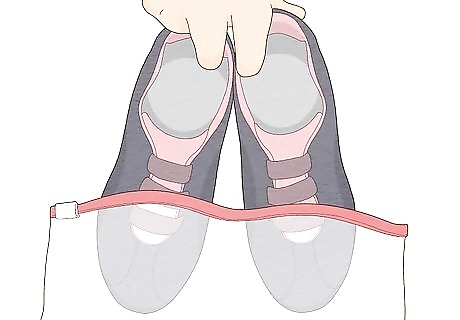
Place your footwear into a plastic bag. If you don't put your shoes in a bag before freezing, your shoes might become frozen to your freezer. A large, resealable plastic bag is highly recommended. Using an open mouthed bag, like a grocery bag, can sometimes cause the shoe stink to transfer to your freezer.
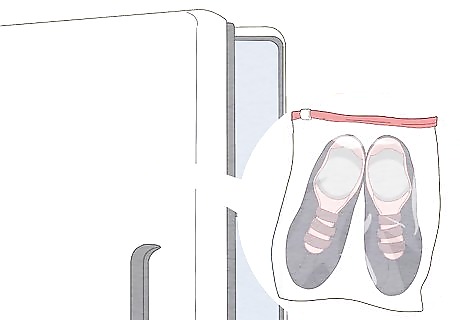
Put your shoes into a freezer. Many kinds of bacteria, but especially foot odor causing bacteria, are weak to cold.Leave your shoes in your freezer for anywhere from 12 to 24 hours. Mild odor might be eliminated quickly, but the longer you allow your shoes to freeze, the more likely the odor causing bacteria will die. If you live in a cold part of the world or a place with cold winters, you may be able to leave your shoes outside to kill the bacteria. However, you might want to cover the tops of your shoes to prevent snow from blowing in.
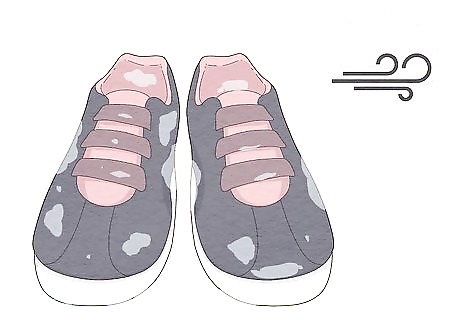
Thaw and dry your shoes. Fresh from the freezer, you might not be able to tell right away if your shoe odor is gone. As the shoe thaws, it should become apparent whether or not your odor problem has been resolved. If the odor remains, freeze your shoe again, allowing even more time for the cold to work on the bacteria. After this, the odor should be gone. To speed the drying process, you might try putting your shoes in a clothes dryer, though this method may be damaging to more delicate pairs of shoes. A blow dryer can also be used to thaw/dry your shoes, though this might take a while.











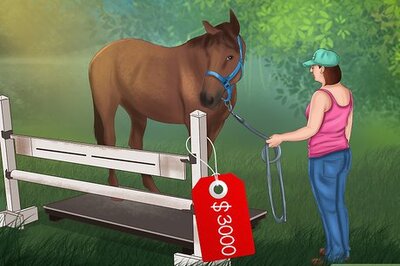


Comments
0 comment